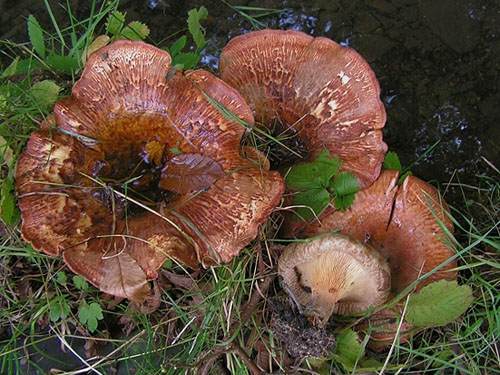Paxillus Fr.
Cap depressed to funnel-shaped, velvety or tomentose, later smooth, cap margin inrolled and remaining so for a long time. Gills forking. Spore print rusty, brownish or vinaceous.
At least eight species are described in Europe. With exception of Paxillus rubicundulus, that is relatively easy to recognize, the rest of the species gravitate closely around Paxillus involutus.
The colour of the spore print is thought to be important for the species recognition, so it should be thoroughly noted when freshly deposited. The crystal that occur in the rhizomorphs are also considered important so any Paxillus collection must contain fruitbodies with preserved basal mycelium.
Reaction with ammonia solution is used to separate some of the species. It has been proven in other bolete genera that the ammonia reaction has little (if any) taxonomic value. However, it has not been evaluated in Paxillus and it should be tested systematically.
Paxillus validus C. Hahn
Similar to Paxillus involutus, P. vernalis and P. obscurisporus, not yet known enough and distinguished on the account of the olivaceous brown spore print, pileipellis hyphae up to 8 μm broad, and especially due to the rhizomorphs with large crystals (up to 2.5 μm).
Habitat. Under planted trees in parks and gardens. Mycorrhizal with lime (Tilia), poplars (Populus) or hornbeam (Carpinus).
Distribution. Not yet understood. Probably not uncommon, but mixed with the other species of the Paxillus involutus complex.
Photographs

Fruitbodies of Paxillus validus. (photo I. Assyova)
Important literature
Henrici, A. 2004. A key to Paxillus s. l. in Europe. – Field Mycology 5(3): 87–88.
Hahn, C. & Agerer, R. 1999. Studien zum Paxillus involutus Formenkreis. – Nova Hedwigia 69: 241–310.
Knudsen, H. & Vesterholt, J. [eds.]. 2008. Funga Nordica. Nordsvamp, Kopenhagen.
Watling, R. & Hills, A.E. 2005. Boletes and their allies (revised and enlarged edition). – In: Henderson, D.M., Orton, P.D. & Watling, R. [eds]. British Fungus Flora. Agarics and boleti. Vol. 1. Royal Botanic Garden, Edinburgh.